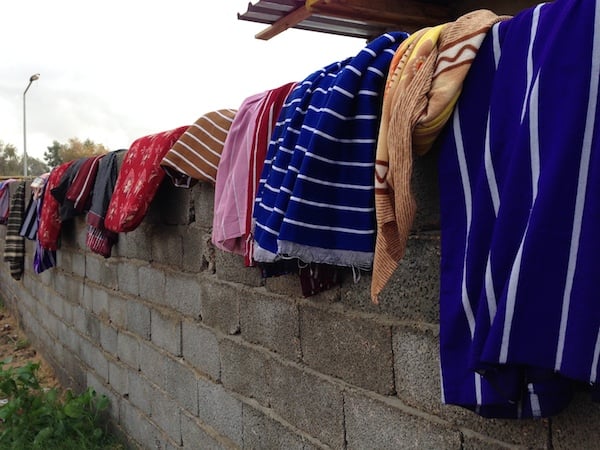By Tom Westcott.
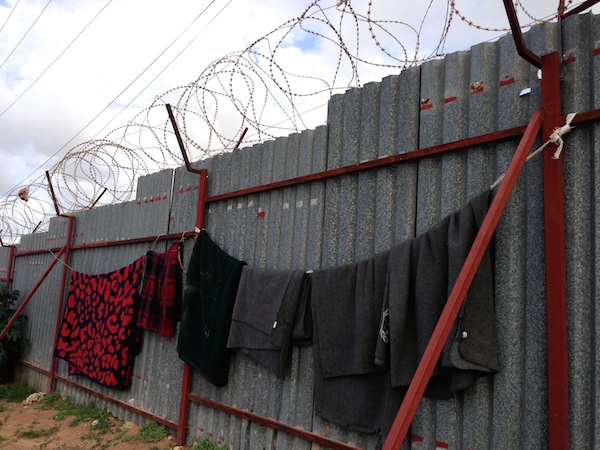
Tripoli, 12 December 2014:
Two days of pouring rain in Tripoli have worsened the already desperate conditions faced by displaced . . .[restrict]Tawergha residents in camps, which they say Libya and the world has forgotten about.
The rough track leading to the Airport Road camp was badly-flooded today, and, inside the camp, muddied puddles stretched between the single-story prefabricated houses that accommodate some 1,500 people from Tawergha. Sodden rugs, blankets and clothes were strung out on lines outside houses and thrown over walls, in an effort to dry them in the weak afternoon sun.
“Five family homes were completely flooded out, and today they are trying to clear up the mess and repair the damage,” camp representative and chairman of the Al-Saber Association Mabruk Eswesi told the Libya Herald. Although many houses let in water, he said, one area of the camp had been particularly affected because it is on a slightly lower level, where water flowed down from the higher parts of the camp.
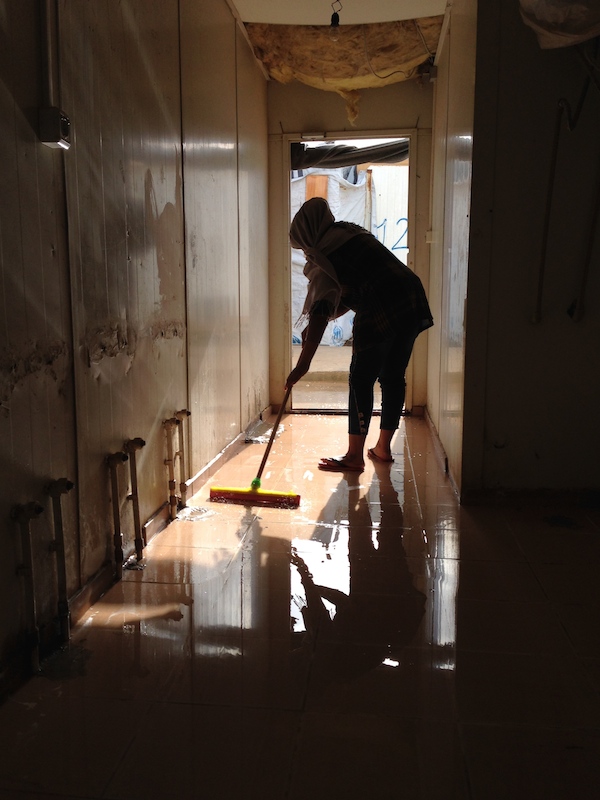
One young man called Ali said the clothes he was standing in were all that had survived the night. “Everything else was soaked through by the flood waters, which were a foot deep last night,” he said. “It flooded our whole house, soaking our bedding, carpets, clothes – everything.” He lives in one of the blocks, originally intended to temporarily house construction site workers in single-room accommodation with shared facilities, but which are now home to entire families.
“We had nowhere to sleep last night and the adults carried the children around in the dark,” Fatima explained, showing us into her tiny home, extended by a roughly-built shack, in which 14 people live. “We dread the rain coming because this always happens,” she said, adding that there were sometimes up to ten such floods in any one year. “The lights were off last night and it was very cold,” she said. Rats had been seen inside the cramped and shared accommodation that morning, whilst the women were trying to clear the water and wash the sodden clothes.
“We feel like everyone has forgotten about us – the government, the organisations and the media,” Fatima said sadly.
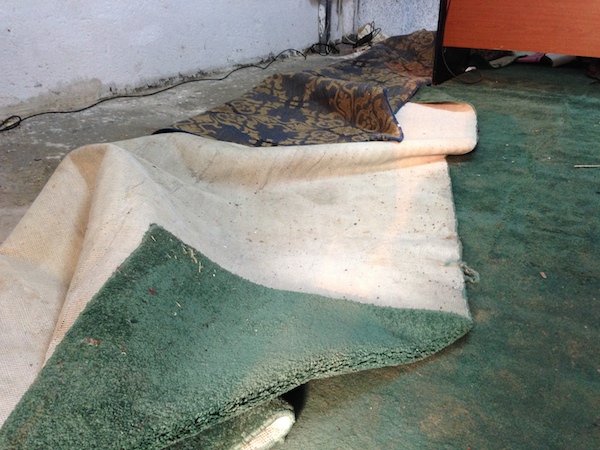
In another home, three women huddled around a small electric fire. “The water flooded through the door and through the roof into our kitchen. We had built a high step to prevent the water coming in but this time the water came right over it,” Marwa says. “All our dried foods were ruined – flour, macaroni, sugar.”
One major concern is the affect of incoming water on the very basic electrical system at the camp. Rainwater often runs freely through gaps in the roofs of the prefabricated houses, causing sparks and short-circuiting the power. This puts further stress on an already overloaded electricity supply, with most families relying on just a few sockets. “There are too many people in too many houses and, at this time of year, every household is using a heater,” Eswesi explained, adding that electrical fires had destroyed several homes since the camp was established nearly four years ago. “These are the wrong wires for the appliances, but what can we do?”
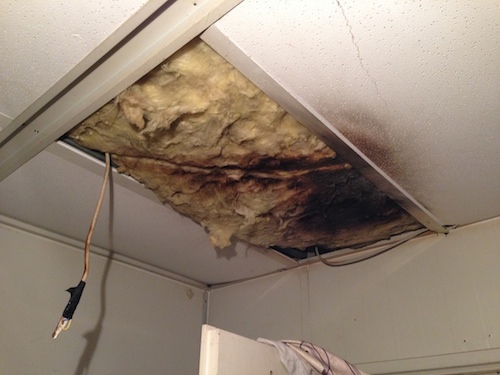
Eswesi said that the UN refugee agency (UNHCR) had called him yesterday and promised to bring more blankets, tarpaulins and cooking equipment to the camp on Sunday. He added, however, that there had been very little recognition or response from the Libyan authorities regarding the problems at the camp, although some individual Libyans continued to make donations. “We want the government and Libyan organisations to come here and see the situation we face,” he said.
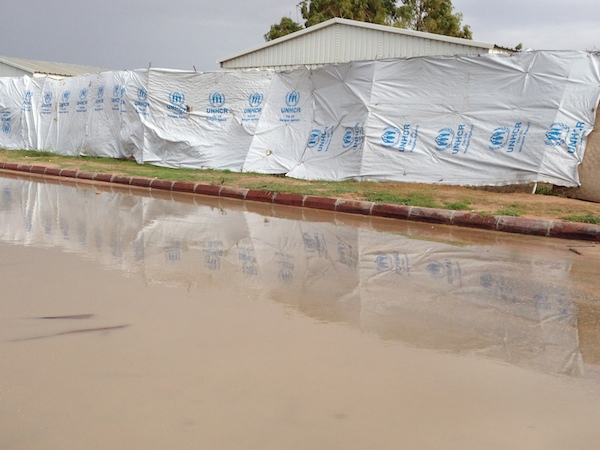
Bad weather is not the only problem faced at the camp which, residents say, is still vulnerable to attack, despite the Tawerhgan inhabitants having lived on the fringes of the city for almost four years. There have apparently been several violent and unprovoked attacks, including one last week by armed gunmen who terrorised residents in the dead of night.
“It was late, about 11 pm, and men attacked the camp with guns and cars. They shot through doors and stormed into several family homes,” Eswesi said. The motive for the attack seemed unclear, he said. “They said they were looking for people they had seen with a kalashnikov,” he said, adding that two men who were visiting from another Tawergha camp in Janzour were taken away.
“The shooting went on and on, for about 30 minutes,” one resident said. “The power to the camp was cut and it was pitch back and all we could hear was shouting and shooting.” She added that it was a very frightening experience.
Camp residents also felt at risk on the road to Tripoli, especially at night, Eswesi said, describing how a 23 year-old man returning from a late-night shift at a petrol station was abducted and killed. “He called his pregnant wife to tell her he was on his way home but he never came back,” he explained. “He was missing for two days before his body was located at a Tripoli hospital. We were told it was a car accident but he had a head-wound and had been shot in the chest.” His family were sent LD500, which they supposed was intended to be some kind of compensation, Eswesi said.
Four years of desperate living conditions and daily challenges make these displaced Tawerghans say they long to return to the homes they left in 2011. “We all want to go back to Tawergha,” an elderly man called Muftah said wistfully. “People had their lives there, they had jobs, projects, ambitions and proper homes with bathrooms.”
